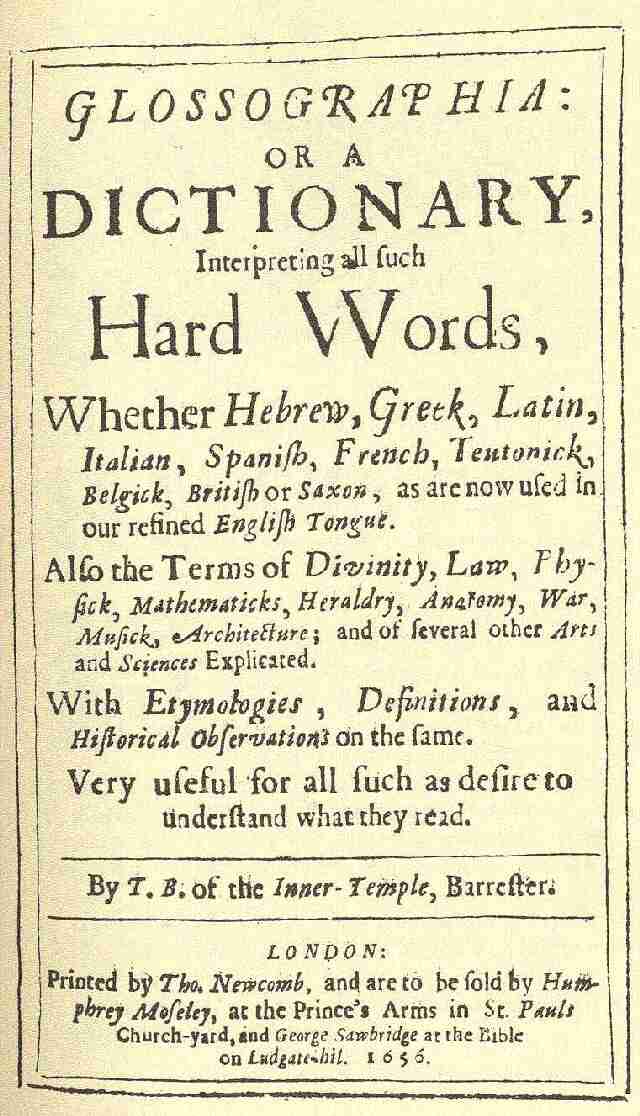
.
The Ingenious Internet
The Internet is, of course, a repository for information and a remarkable means of uniting geographically disparate individuals. It is also (with over 2 billion web sites, and more every day) very difficult to find truly unique and interesting web sites. I have always humbly admired those whose efforts, far greater than my own here at the Phrontistery, have presented intelligent and eccentric material for general consumption (and free of charge). Each of the bold sites listed below is eccentric, thought-provoking and innovative - in some cases, perhaps even important. Some are humorous, others less so. Regardless, all of these gems have the extraordinary qualities of genius and uniqueness that represent the best that the Internet has to offer. Enjoy!
Ambigram.com: The construction of ambigrams is a most peculiar pursuit, brought to popular attention by author Douglas Hofstadter. An ambigram is a word or phrase that can be read in multiple ways or from multiple vantage points, relying on unusual ways of writing letters. For instance, an ambigram of "forthright" that can be read upside-down as well as normally might look a little like this:

Urban Legends Reference Pages: An enormous storehouse of bizarre, interesting and even useful information on the modern myths, rumours and hoaxes that permeate our society (especially in this electronic age) and which collectively have been assigned the name of urban legends. Barbara and David Mikkelson have, for the past six years, collected and classified these rumours, evaluating the truth of each (and there are plenty of true rumours amidst a wealth of falsity) and insightfully commenting on what each tells us about our society and its values. I can't tell you how many times I've been surprised that a piece of information I had been told by my parents or teachers has been shown to be erroneous on this site. This is one of only a handful of sites that I visit every day.
Landover Baptist Church: The greatest testament to the wit and perspicacity of the authors of this site is the host of people who have failed to realize that it is, in fact, a parody. This delightful and not-so-gentle lampoon of fundamentalist religious beliefs is, to nearly all appearances, a web site dedicated to the mythical but all-too-real-seeming Landover Baptist Church, where the unsaved are unwelcome. It pointedly points out the foibles and fallibility of those who assume that their own received wisdom and faith constitute the whole truth, and as such, it serves to remind us of the dangers of intolerant absolutes of thought and doctrine. At the same time, it is enormously hilarious and is full of mock articles written by "Christian fundamentalists". While it has been demonised by those who perceive it as an atheistic threat to their belief system, the folks at Landover are true comic geniuses of the most subtle and penetrating sort.
Darwin Awards: The Darwin Awards are facetiously granted to individuals who, through their own stupidity, remove themselves from the gene pool of the species homo sapiens, thus exemplifying natural selection in action. Collecting and evaluating news stories and personal accounts from all over the planet, this site is a storehouse of grim yet sardonic humour. The Darwin Awards celebrate humanity by gently reminding us that our species is a fundamentally idiotic one, and at the same time amuse and entertain those of us who have not (yet) done anything worthy of being excised from the planet.
Annals of Improbable Research: One of the most unusual academic journals in existence. Well, all right, it isn't exactly an academic journal, but it does operate out of Harvard. The Annals of Improbable Research document and discuss weird and strange scientific experiments, particularly humorous ones that have knowingly and wittily been conducted for the amusement of nerds like yourself. As its editors put it, "About a third of what we publish is genuine research, about a third is concocted, and about a third of our readers cannot tell the difference." AIR is primarily a print journal, but you will still find an incredible amount of truly funny material archived on this site. One of the most interesting areas of the site is that dedicated to the Ig Nobel Prizes, whose purpose is to honour real scientists whose bizarre research "cannot or should not be reproduced".
Postmodernism Generator: This link won't actually take you to a web site, but it will write a unique essay for you. Granted, it won't be a long essay, or a particularly good one, but given that no human being will have ever seen it prior to you reading it, it certainly will be original. It has long been known among academics that one of the "redeeming" values of the philosophical / literary school of postmodernism is that its use of bizarre jargon and incomprehensible sentences practically guarantees that no one will be able to understand any postmodernist essay well enough to refute it. It is this quality that led physicist Alan Sokal to write a parody paper entitled "Transgressing the Boundaries: Toward a Transformative Hermeneutics of Quantum Gravity" and submit it to the journal Social Text, where it was promptly accepted, much to its editors' later embarassment. All this essay generator does is to throw together randomly postmodern jargon, a few 'big names' and some unusual sentence structure to produce a unique but meaningless work of non-fiction. Try it and see for yourself.
Lost in Translation: This site illustrates just how far we have truly come in the field of computerised translation - or does it?. Enter any phrase or sentence in English, and it will translate it sequentially back and forth from French, German, Italian, Portuguese and Spanish into English, using the Systran online translator. This series of 10 translatory steps, far from illustrating the wonders of technology, demonstrates the failings of current translation technology, but more importantly, the results of these repeated translations are simply hilarious. For instance, a simple sentence such as "If the shoe fits, wear it." becomes, bizarrely, "If the ice-slide if to modify for particular requirements, to transport it."! Whether taken as a stunning critique of translation technology, or simply as a quirky way to spend hours doubled over laughing, the site is extraordinarily ingenious.
Project Gutenberg: One of the earliest projects that can even vaguely be called "online", Project Gutenberg began over thirty years ago as an effort by Michael Hart to use computers to transmit and store important documents in simple formats so that they would be accessible to anyone. Today, it houses over 3,000 copyright-expired documents including the classics of literature, important reference works and political texts, and other strange and wonderful material, such as the entirety of the Human Genome Project. All of them are available for download as ASCII text files, completely free of charge, for you to use as you see fit. Based on the premise that e-texts can be distributed much more cheaply than regular texts, the Gutenberg philosophy is truly a noble one.
253: This hypertext novel by Geoff Ryman, a respected print author of science fiction, is an extremely innovative and successful attempt to fuse the Internet with fiction. In it, he presents the story of exactly 253 passengers and crew on a London Underground train, each with a brief vignette of their thoughts and activity presented 253 words. It's not a 'novel' in the sense that not much happens, and because it is written in hypertext, readers are encouraged to revel in the non-linearity of the text, moving from character to character, car to car, according to their own rather wishes rather than the author's edict. As such, 253 is perhaps the first piece of fiction that could only be accomplished through the Internet. You may disagree with my assertion that it's an intriguing piece of literature, but it cannot be denied that it is the first of what will no doubt be many avant-garde works of Internet fiction.
The Long Now Foundation: This organization is dedicated to the principle that, if our civilisation is to survive, individuals, communities and nations must be willing and able to think in extremely large time frames - not merely hundreds, but thousands of years. It has been 10,000 years since the origins of agriculture - where will we be, what will concern us, 10,000 years hence? And yet we can't even read data from computers that are less than 50 years old! Among the projects that the foundation supports are a 10,000 year clock, a long-term digital storage project, and an effort to catalog all species of life on Earth. They may seem like idealists, or hopeless romantics, but their efforts are based on the most up-to-date science and their goals, while visionary in nature, are firmly rooted in the real world.
Institute of Druidic Technology: Turning from the sublime to the ridiculous, this 'institute' is a hilarious parody site that investigates how the roots of modern technological innovations lie among the ancient Celts of Britain. Using the "RUNIX" operating system, remarkable software was developed to manage huge building projects, but also for amusement, such as the world's first computer game, "Osric the Stoat". With their advanced knowledge, the druids built the world's first mouse to operate these systems (looking remarkably like a spearpoint). While others deride the lack of moving parts in these ancient computers, they simply have not had the vision to see the wisdom and technological sophistication that these people of long ago possessed ...
Museum of Unnatural Mystery: This online 'museum' is dedicated to the study and examination of unusual phenomena, 'paranormal' events and fringe science. Lee Krystek, its curator, has gone to enormous lengths to present us, not simply with sensationalistic accounts that invoke unexplained or implausible powers, but solid factual accounts of hundreds of unusual phenomena, ranging from odd archaeological sites to lost biological oddities to Bible codes. In doing so, he presents us not only with a well-written, well-researched site that is a credit to scientific investigation, but also an extremely funny look into the weird world in which we live.
The Dead Media Project: A collection of entries, ranging from brief 'field notes' to longer essays, describing media that, for one reason or another, have become defunct, extinct, obsolete - kaput. Based on an idea by cyberpunk author Bruce Sterling, its purpose is to describe these media, not merely to lament their passing but to inform others about their history and to see what can be learned from their failure. It reflects the concern that, in this age of ephemeral technology, too many lessons are being lost. Behind it, the meta-concern that the Internet itself may be a dead medium far sooner than we think.
Googlewhack: This lexical pastime started early in 2002. All you need to do is go to the Google search engine and enter any two words. If it turns up one and only one page that contains both words, you have achieved a Googlewhack! To add more complexity, you can 'score' your whack by entering each word separately, taking the two individual totals of pages and multiplying them. Now, most of the Phrontistery pages apparently don't count, under the 'word list' exception, but I still get plenty of people who find my site with whack-like word pairs. Warning: this pursuit may be extremely addictive; over 80,000 whacks have been posted so far.
The Secret Lives of Numbers: For those of you who may not know, my dissertation research is on the history of numerical notation. So imagine my delight when I found this site, an insightful and ingenious visualization of the use of numbers on the Internet. The authors have done a periodic exhaustive study of how many times each number from 1 to 100,000 appears in search engines and present this material in an interactive graphic format. It reveals the patterned way in which number influences our lives by providing a "numeric snapshot of the collective consciousness". I strongly recommend that you check this out.
The Invisible Library: The Invisible Library is a collection of books that have never existed. Whenever an author writes a work of fiction and creates an fictional book, he or she is adding to the list of potential entries in this library. While you may never be able to read Bilbo Baggins' There and Back Again, you can find it listed in this library's catalog. There are now something like 3,000 titles in this remarkable collection of "imaginary books, pseudobiblia, artifictions, fabled tomes, libris phantastica, and all manner of books unwritten, unread, unpublished, and unfound". While it is perhaps not that useful to consult a listing of imaginary works, I guarantee that it will pique your curiosity and perhaps inspire you to track down the real books in which they were first imagined.
This Page Intentionally Left Blank project: Formerly, for technical reasons, some books were printed with a blank page on which "this page intentionally left blank" was written. This online project is attempting to revive this practice with respect to Web pages in order "to offer internet wanderers a place of quietness and simplicity on the overcrowded World Wide Web". A noble goal, if somewhat unusual. To participate, all one must do is put a blank page on one's web site. The number of people who have joined in this philosophical and aesthetic effort is really quite staggering. The Phrontistery features a Blank Page according to the recommendations of the TPILB-Project.
I hope you have found this site to be useful. If you have any corrections, additions, or comments, please contact me. Please note that I am not able to respond to all requests. Please consult a major dictionary before e-mailing your query. All material on this page © 1996-2021 Stephen Chrisomalis. Links to this page may be made without permission.








